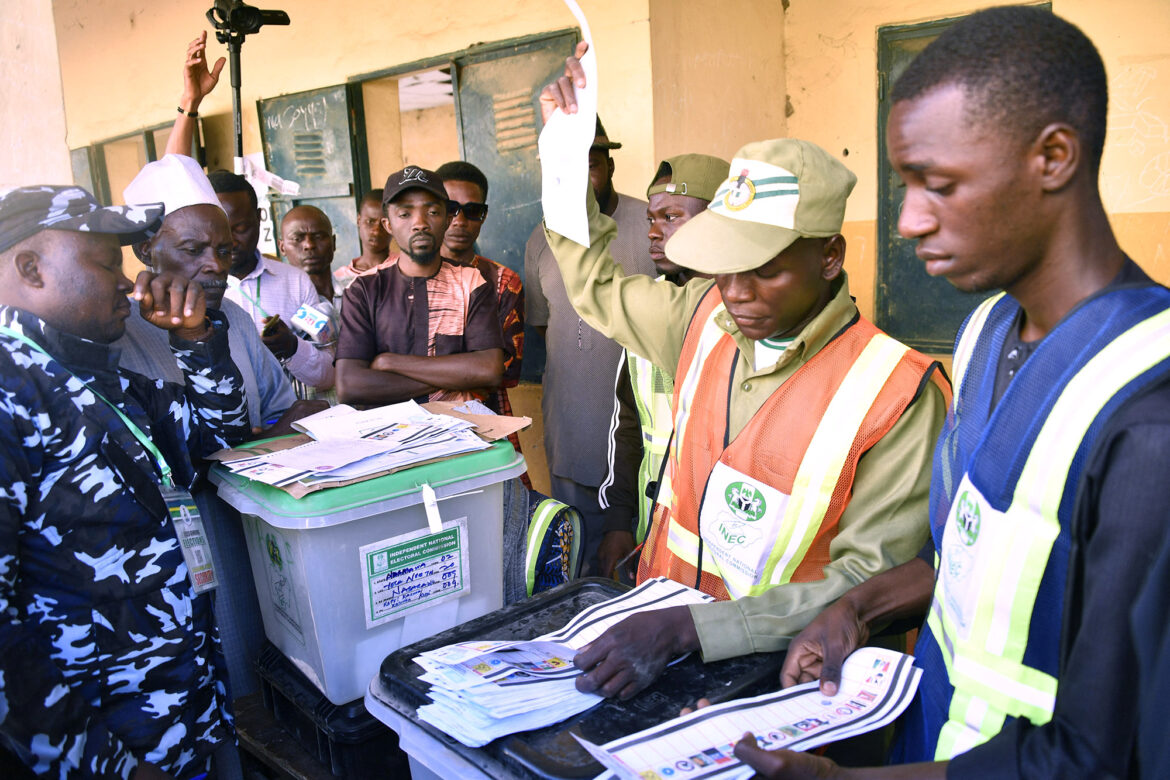By Haruna Gimba with agency report
Nigeria’s election officials counted ballots after polls closed on Saturday to pick new state governors, amid reports of scattered violence, voter intimidation and votes buying.
Polls closed on Saturday and counting immediately followed, but time was extended where voting started late. Final results are expected by Monday.
In south-eastern Imo state, a hotbed of separatist violence, security forces rescued 19 electoral officials who had been abducted by thugs, but election materials were lost, the Independent National Electoral Commission (INEC) said.
“While the commission remains grateful to the security operatives, it condemns such acts of thuggery, intimidation and disenfranchisement of voters,” INEC said in a statement.
Civil society observer group Situation Room said officials were at polling stations by 0830 GMT at most polling stations it monitored and also observed vote buying in a few areas.
The INEC is under scrutiny after observers from the European Union (EU), the Commonwealth and other bodies reported several problems during last month’s presidential election, among them failures in systems designed to prevent vote manipulation.
The observers criticised the INEC for poor planning and voting delays but did not allege fraud.
Governors wield enormous influence in Africa’s most populous nation of more than 200 million and their support often decides who becomes president. Some governors preside over states whose annual budgets are bigger than some small African countries.
The INEC postponed the gubernatorial poll by a week, saying it needed to reconfigure electronic voting machines that are at the centre of the dispute over the presidential vote won by Bola Tinubu of the ruling All Progressives Congress (APC).
The main opposition People’s Democratic Party’s (PDP) Atiku Abubakar and Labour Party’s Peter Obi rejected it as fraudulent and will challenge the results in court.
Voters were choosing governors in 28 of 36 states and new state assemblies across Nigeria.
Eyes on Lagos and Adamawa States
The race that has generated the most interest is in Lagos, President-elect Bola Tinubu’s home state and Nigeria’s commercial hub, where he is nicknamed the Kingmaker for his enduring political influence.
At stake is control of an annual $4 billion budget and running Africa’s largest mega city of more than 20 million, home to some of the country’s billionaires, including Aliko Dangote who is building a multi-billion-dollar oil refining complex.
But Lagos is also teeming with poverty as millions live in slums without power and running water, and residents, rich and poor, have to endure daily traffic jams and pollution.
Tinubu governed Lagos from 1999 to 2007 and has gone on to play a major role in picking every successor since.
Peter Obi, whose support came from young and urban voters, beat Tinubu in Lagos last month. That has buoyed his Labour Party, which is aiming to dethrone APC from running the state.
The ruling APC’s incumbent Babajide Sanwo-Olu, who has been in the Lagos state government for the past two decades, faces a strong challenge from Labour Party’s Gbadebo Rhodes-Vivour, an architecture and political activist.
The two candidates, as well as Tinubu, voted separately in Lagos.
Gbadebo Rhodes-Vivour alleged voter intimidation on Saturday and said the INEC moved some polling units without warning. Sanwo-Olu said any cases of violence should be investigated.
Nigerians will also be watching the race in north-eastern Adamawa state, a conservative and largely Muslim state, which could produce the country’s first elected female governor, Aishatu Dahiru Binani, gubernatorial candidate of the APC, who slug it out with Governor Ahmadu Umaru Fintiri of the PDP.




